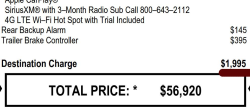— A new vehicle destination charge lawsuit against Fiat Chrysler remains dismissed after an appeals court agreed with the lower court dismissal.
The Chrysler new vehicle destination charge is listed on every window sticker, called a Monroney label.
The fee is paid by a dealership direct to FCA, but the class action lawsuit alleges it is wrong for the automaker to make any profit from the charge to deliver a new vehicle to a dealer.
The plaintiffs assert FCA's new vehicle destination charge violate consumer protection statutes because Chrysler “misrepresents” the total cost of vehicles purchased by the plaintiffs. FCA supposedly does this “by omitting mandatory fees from advertised prices and misrepresenting the nature and purpose of fees.”
Automakers have increased their new vehicle delivery fees, especially over the past 10 years, but the lawsuit alleges Chrysler's destination charges are higher than its competitors.
At its core, the new vehicle class action lawsuit contends it is deceptive, unfair or fraudulent for Chrysler to list a destination charge that is more than the cost of delivering the vehicle to the dealership.
The initial class action included all purchasers of new 2018 and later Chrysler, Jeep, Dodge, Ram, Fiat and Maserati vehicles in the U.S. But the appeal alleges FCA violated consumer-protection statutes in Florida, Georgia, Illinois, Iowa, Michigan, Missouri, New York, North Carolina, Ohio, Pennsylvania and Texas.
FCA filed a motion to dismiss the original destination charge class action, a motion granted by the judge who dismissed it without prejudice. But the judge denied the plaintiffs leave to go forward with a second amended lawsuit because it would simply be dismissed for the same reasons as the first class action.
Chrysler New Vehicle Destination Charge Lawsuit — The Appeal
The plaintiffs appealed to the U.S. Court of Appeals for the Third Circuit, but did not appeal the dismissal of the class action. Instead, the plaintiffs appealed because the district court judge didn't allow the customers to amend and refile their destination charge lawsuit.
When the district court dismissed the first class action, the judge ruled the plaintiffs had not plausibly alleged this pricing practice was deceptive or unfair, nor that it caused them damages. The judge then went on to find the proposed amended lawsuit did no better.
The Third Circuit agreed.
The appeals court notes the state statutes do vary but all require proof of a deceptive act or unfair practice and most require proof of damages. The appeals court found the plaintiffs still fail to "plausibly allege that the destination charges were deceptive or unfair."
"Plaintiffs have not claimed, for example, that the destination charge they paid was higher than the amount FCA charged the dealers, allowing the dealers to make a secret profit from destination charges paid by consumers. Further, even if FCA’s destination charges are higher than its competitors, Plaintiffs have failed to allege how those accurately-disclosed higher charges, published clearly on the vehicles’ window stickers, are in and of themselves, deceptive or unfair." — Third Circuit
The appeals court also found even the customers who sued admit the destination fee is understood to represent an "average" cost to deliver a new vehicle to a Chrysler dealership.
According to the Third Circuit, consumers should expect a company will make a profit from its actions, which is why that company is in business. But even if FCA's destination charge was deceptive, the appeals court found the plaintiffs still have not plausibly alleged those practices caused the plaintiffs to suffer damages.
The Third Circuit found most importantly, the plaintiffs "do not state that the destination charges caused them to pay more than they would have otherwise paid for their vehicles."
Additionally, if vehicle owners paid more for their vehicles than the sum of the MSRP (manufacturer's suggested retail price) and the real cost incurred by FCA to ship the vehicles to dealers, the increased price would be "attributable only to the dealers, not to FCA." And it was FCA which was sued.
According to the Third Circuit, studies have shown when consumers look to lease or purchase a car, they tend to primarily consider the manufacturer's suggested retail price, not additional fees like the destination charge.
The Chrysler new vehicle destination charge lawsuit was filed in the U.S. District Court for the District of Delaware: Beeney, et al., v. FCA US, LLC, et al.
The plaintiffs are represented by the Bifferato Firm, Handley Farah & Anderson PLLC, Gibbs Law Group LLP, and Baron & Herskowitz.

